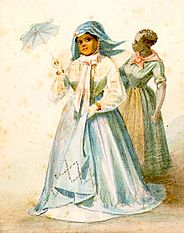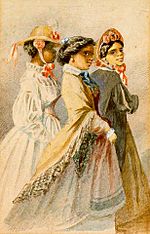Plaçage facts for kids
Plaçage was a system in North American colonies ruled by France and Spain. In this system, European men formed partnerships with women of color, including those of African, Native American, or mixed heritage. The word "Plaçage" comes from the French word placer, which means "to place with."
These women were not officially recognized as wives by law, but they were known as placées. Among free people of color, these relationships were sometimes called mariages de la main gauche, meaning "left-handed marriages" or unofficial partnerships. If the man died, the placée and her family could sometimes claim a part of his property, up to one-third. In some cases, if the woman was enslaved, she might even gain her freedom through this system.
When Plaçage Was Common
The plaçage system was very common during the time when France and Spain controlled the Louisiana territory. It was most widespread between 1769 and 1803, during the Spanish colonial period.
Why Plaçage Started
Plaçage began because there were many more men than women in the early colonies. Most of the first European settlers and explorers were men. It was difficult to convince European women to move to the colonies because life there was very hard. Because of this shortage of European women, men often formed relationships with Native American women, free women of color, and enslaved African women.
Where Plaçage Was Practiced
Plaçage was widely practiced in New Orleans, a major city in the Louisiana territory. The wealthy plantation owners in New Orleans had enough money to support this system. It also happened in other cities that were influenced by Latin cultures, such as Natchez and Biloxi, Mississippi in Mississippi, Mobile in Alabama, and St. Augustine and Pensacola in Florida. The system was also present in Saint-Domingue, which is now the country of Haiti. Plaçage became a well-known part of New Orleans' unique and diverse society.
See also
 In Spanish: Plaçage para niños
In Spanish: Plaçage para niños
 | John T. Biggers |
 | Thomas Blackshear |
 | Mark Bradford |
 | Beverly Buchanan |



